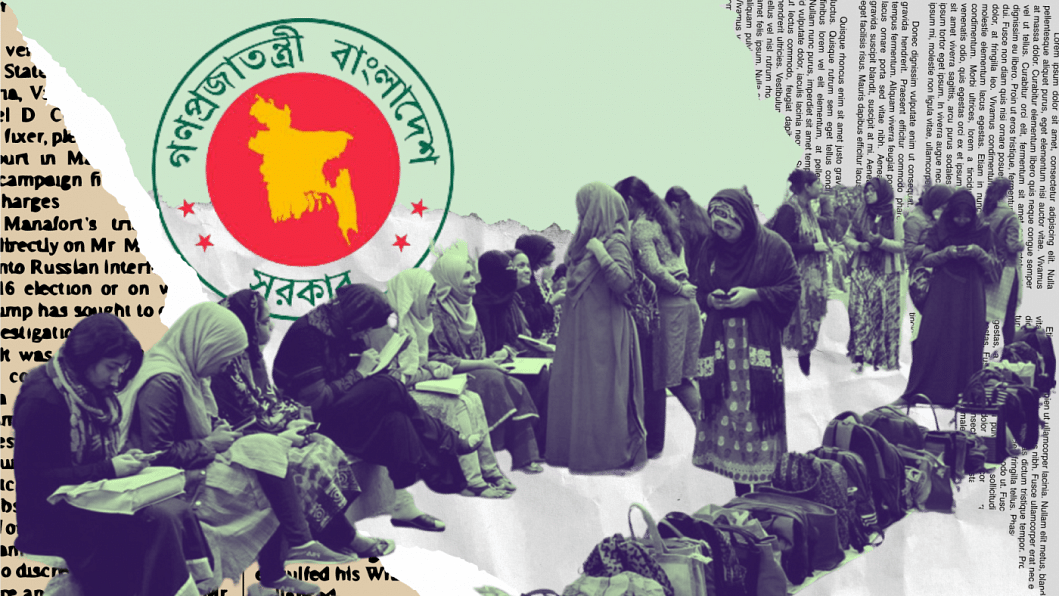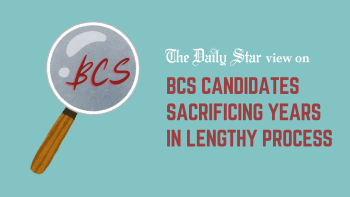Time to end discriminatory quotas in civil service promotions

The persistent issue of discriminatory quotas in civil service promotions in Bangladesh has sparked significant controversy, particularly in the context of senior public administration posts. While the movement against discriminatory quotas in civil service appointments has largely been resolved following student protests and widespread public discontent, the issue remains unresolved in the realm of promotions. This ongoing struggle highlights the deep-seated challenges that Bangladesh faces in its efforts to create a merit-based public administration system.
The senior positions in Bangladesh's public administration, such as deputy secretary, joint secretary, additional secretary, and secretary, are primarily filled by officers from the administration cadre, with representation from 25 other cadres. The Senior Service Pool (SSP) was established in 1979, ostensibly based on the results of a competitive civil service examination. However, from its inception, the SSP has been marred by practices that undermine the principles of meritocracy. The first cohort admitted to the SSP consisted entirely of individuals from the BCS administration cadre, bypassing the examination requirement—a trend that continued in subsequent intakes.
This lack of adherence to merit-based selection has resulted in a disproportionately high representation of the administration cadre within the SSP, driven by two key factors: regulatory capture and a lack of confidence in the merit-based examination process. The administration cadre, which has long held a monopoly on secretarial leadership, has resisted competitive examinations that could potentially challenge their dominance. By 1987, the SSP had become obsolete due to the absence of competitive recruitment, and the system evolved into a quota-based mechanism.
Under this quota system, 75 percent of promotions in the civil service were allocated to the administration cadre, leaving just 25 percent for all other cadres. While administration cadre officers consistently benefited from this system, officers from other cadres faced discrimination. This approach undermines the principle that all officers, regardless of their cadre, should be evaluated equally during promotions based on their combined merit list as determined by the Public Service Commission (PSC). Instead, promotions are skewed in favour of the administration cadre, perpetuating a form of professional prejudice and creating a deep schism within the civil service.
The division within the civil service has been exploited by political governments over the years, with the SSP becoming an instrument of political patronage. This has exacerbated inequalities and fuelled discontent among officers from non-administration cadres. The quota system was legally contested in the High Court and the Supreme Court, with the plaintiffs arguing that the system was discriminatory and violated Article 29 of the Constitution, which ensures equality of opportunity in public employment.
In a landmark judgment on February 13, 2003, the High Court declared the quota system discriminatory and ruled the writ cases absolute, stating that the system violated the Constitution. The court emphasised that the same yardstick should be applied at all levels of promotion, given that all officers were appointed through the same competitive examination. The government appealed this decision to the Supreme Court, which upheld the High Court's ruling, stating that there was no rational basis for the quota system in the promotion of joint and additional secretaries. The Supreme Court declared the system an "unreasonable classification" and ordered the cancellation of any appointments made under this quota system.
Despite this clear directive from the judiciary, the government has selectively implemented the ruling. The executive body fully complied with the directive concerning quotas in civil service appointments but failed to implement the ruling regarding promotions. This selective enforcement highlights the entrenched power dynamics within the civil service and the reluctance of the administration cadre to relinquish its dominance.
Although the quota system for promotions was eventually dismantled, the allocation of senior positions remains largely at the discretion of the administration cadre. This centralisation of power has stifled the diversity of expertise and perspectives that other cadres could bring to the table. As a result, the transition from government to governance—where a more inclusive and participatory approach to public administration could be realised—has been obstructed.
The rivalry between the administrative elite and other cadres raises critical questions about the future trajectory of civil service reform in Bangladesh. In recent years, the representation of officers from non-Administration cadres in higher positions has dwindled to as low as 10-12 percent, further marginalising these groups. The lack of inclusivity in the promotion process has created a culture of elitism within the civil service, where administration cadre officers are perceived as inherently superior to their counterparts from other cadres.
Following the recent end of the Awami League regime, a new movement has emerged, led predominantly by officers from the administration cadre who were denied promotions during that period. This movement, however, lacks representation from other cadres, suggesting that the fight for fair promotions is still seen as an issue exclusive to the administration cadre. This perception is deeply problematic, as it ignores the systemic discrimination faced by officers from other cadres who have long been disadvantaged by the quota system.
To foster a more egalitarian civil service, it is imperative that the new government addresses these disparities head-on. The allocation of senior positions should be based on merit and expertise, rather than cadre identity. The historical phrase "go to Lanka, become Ravan" serves as a cautionary reminder of the dangers of power consolidating in the hands of a few. It is crucial that the civil service evolves into a more balanced and equitable system that values diversity and meritocracy.
The struggle against discriminatory quotas in civil service promotions is far from over. While the legal battle may have been won, the fight for a truly inclusive and merit-based public administration continues. The new government has a critical role to play in addressing these inequities and ensuring that the civil service is a reflection of the diverse talents and expertise that exist within Bangladesh. Only by embracing these principles can the country move toward a more just and effective governance system.
Gabriel Ahmed works for the Bangladesh government.
*The author's name has been changed for privacy reasons.
Views expressed in this article are the author's own.
Follow The Daily Star Opinion on Facebook for the latest opinions, commentaries and analyses by experts and professionals. To contribute your article or letter to The Daily Star Opinion, see our guidelines for submission.

 For all latest news, follow The Daily Star's Google News channel.
For all latest news, follow The Daily Star's Google News channel. 





Comments